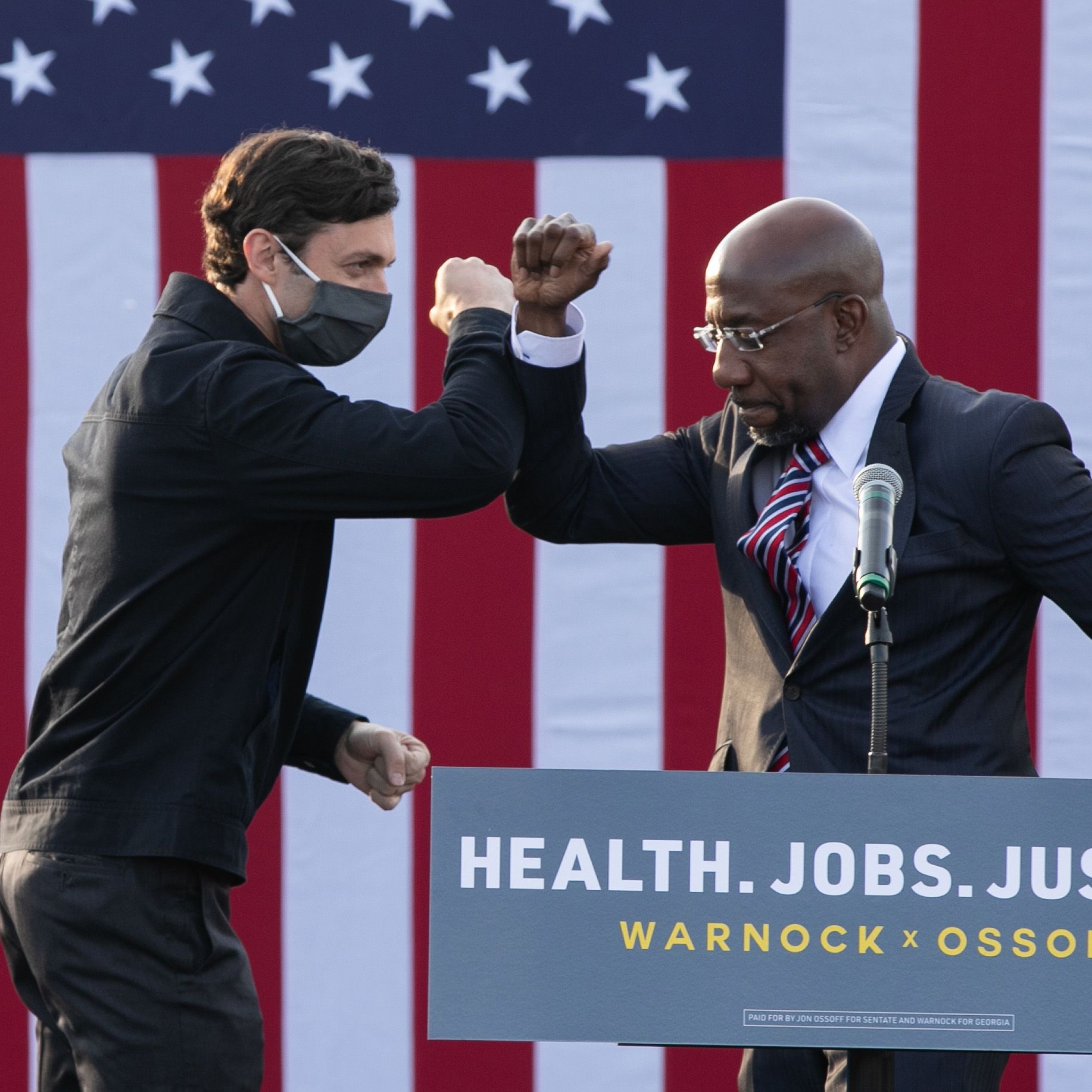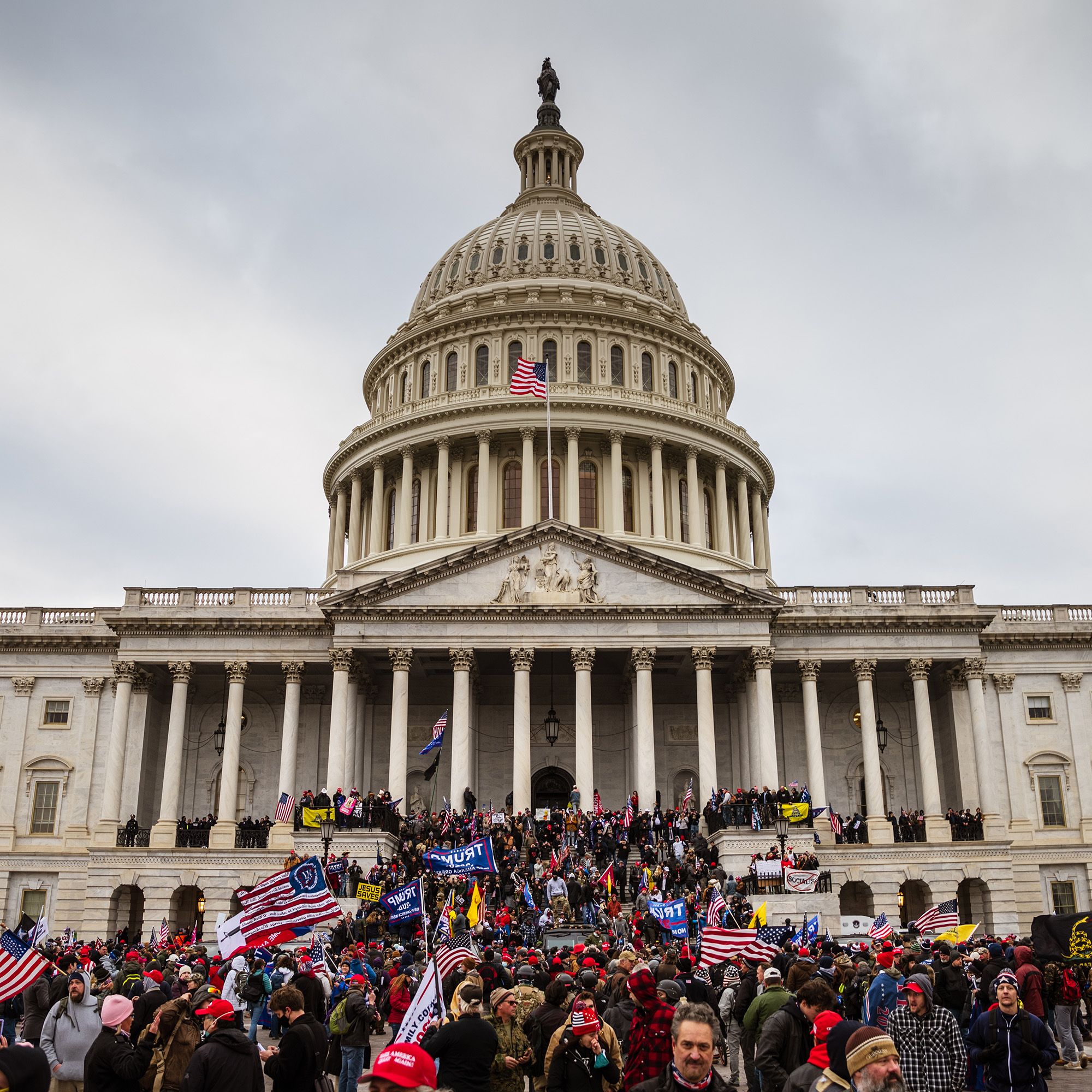On January 6, We Triumphed and Imploded. What Comes Next?
Two days before Georgia’s runoff election at an intersection 35 miles north of Atlanta, 20 South Asians, myself included, waved campaign signs for Democratic Senate candidates Jon Ossoff and Reverend Raphael Warnock, as well as Daniel Blackman, candidate for Public Service Commission. Members of our organization, They See Blue Georgia, spent the previous two months pulling out all the stops to reach South Asian voters: We erected campaign signs near polling places where South Asians voted, passed out campaign literature specific to the South Asian community, knocked on doors, wrote postcards, and phone-banked in English and four South Asian languages. We jumped from one voter outreach method to another, searching for every possible needle in a haystack—the voter who didn’t know their precinct, the voter who wasn’t sure whether they were registered to vote, the voter who may not have known where to drop off their absentee ballot. We invested a significant amount of our energy in Forsyth County, a Republican stronghold notorious for its racist history that also has one of the fastest-growing Asian-American and Pacific Islander populations in the country.
Thirty minutes into waving signs, as a bitter wind ripped through my jacket, I turned to one of our members, a tireless activist who answers almost every call to action. “The abuse isn’t so bad today, is it?”
She shrugged. “It’s really hard to know anymore.”
Our sign-waving rallies in Forsyth were frequently met with fury. Pickup trucks flying giant Trump flags would rev their engines and spew black exhaust in our faces. Their drivers would hurl racial slurs. They’d make several passes, speeding up as they approached, slamming on their brakes at the last second—their wheels screeching on the road in a not-so-veiled game of chicken. More trucks would follow with their own Trump flags, encircling us like sharks—their passengers yelling and flipping us off.
At the last rally before the presidential election, my 12-year-old daughter and I stood on a side road away from our main rally group. A driver pulled right up alongside us, and, shaking with rage, she pointed her finger at us and spat, “Fuck you!” My daughter didn’t flinch. The little girl who had wept in my lap four years earlier when she learned our country elected Donald Trump had grown accustomed to such vitriol.
I began organizing in the Asian-American community in the spring of 2017, when Ossoff ran against Republican Karen Handel to flip the Sixth Congressional District, a GOP bastion. (Former Health and Human Services Secretary Tom Price and former House Speaker Newt Gingrich previously represented this district.) In 2018, we mobilized behind Georgia Minority Leader Stacey Abrams, Lucy McBath (who would beat Handel to become the third Black woman in Georgia to join Congress), and all the down-ticket Democrats. After major voter roll purges, long lines, precinct closures, and numerous issues with our electronic voting machines, then Secretary of State Brian Kemp, who oversaw his own race, became the 83rd governor of Georgia.
It was a crushing loss, and the open hostility from Trump supporters has continued to worsen every year, decimating the line between decency and malice. My esteemed colleagues regularly received death threats. Passersby called us socialists and terrorists. The trauma took its toll. Every time I left my house for an outdoor election event, I had to take a moment to talk myself out of my fear.
This last two months of Trump’s presidency have served as our state’s reckoning. Joe Biden won Georgia, and Georgia flipped the Senate blue. These twin wins shift control to the Democrats and deliver Georgia’s first Jewish and first Black senators to Washington. (Ossoff, at age 33, will also be the youngest Democrat to serve in the Senate since Biden assumed office in 1973.)
But on the same day the runoff races were called, white nationalist insurrectionists stormed the Capitol. Armed with guns, zip ties, and bombs, they smashed through windows, trashed offices, terrorized Capitol staff and elected officials, crushed a Capitol police officer, and killed another, officer Brian Sicknick. The home of our legislative body was the scene of a premeditated massacre organized on public platforms, largely ignored by law enforcement, and cheered and supported by numerous Republican members of Congress and right-wing operatives, including Ginni Thomas, wife of Supreme Court Justice Clarence Thomas.
I’ve spent the last several days viewing footage of this attempted coup. In the faces of these terrorists, I see the same rage of the Trumpers I encountered on the streets as an organizer—brazen, entitled, hateful. I may have risked my health and safety to get out the vote during a global pandemic, but I never once kidded myself. Our democratic victories, as glorious as they are, are incapable of rescuing us from fascism. No election outcome can completely reverse what this nation has become. Once fiction becomes fact, once propaganda becomes news, once science is replaced with conspiracy theories, once every check and balance is dismantled, we are no longer free. And until these traitors and terrorists are held accountable and prosecuted to the fullest extent of the law, we remain in a state of clear and present danger.
As tempting as it might be to deem January 20, 2021, as the dawn of a new era, we must resist such magical thinking. Biden’s inauguration and the swearing in of our new Democratic senators is not the postscript to a revolution; it is simply our last chance to pull ourselves from the immense wreckage we have wrought. The survival of these United States will continue to hang in the balance for years to come. And it will demand that we not unsee what we have seen.
Our democratic victories, as glorious as they are, are incapable of rescuing us from fascism. No election outcome can completely reverse what this nation has become.
Two days after the runoff, I walked outside to remove the campaign signs from my front yard. In the weeks leading up to the presidential and runoff elections, I had placed several dozen of them around town. There were stolen, knocked down, and vandalized. Two giant signs had been sliced off their sturdy metal stakes with box cutters. The only signs that survived this grueling election season were the ones just outside my house.
As I stood before them, I thought about our nation’s frightening future. I thought about what we organizers, volunteers, and voters endured leading up to these elections and how after three disappointing losses in a row—Hillary Clinton’s in 2016, Ossoff’s in 2017, and Abrams’s in 2018—we achieved what no one outside our state thought we could. It may seem impossible to celebrate this historic moment in the wake of a siege, but we must always remember that on January 6, as our nation descended into darkness, the people of Georgia shined a bright light.
So I changed my mind. The signs, I decided, had earned the right to stay up a little longer. I left them where they were, turned, and went back inside.
Source: Read Full Article


